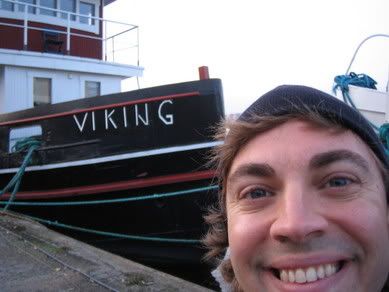 That is the Doctor and Rose watching the end of the world (our world), which is about to be fried as the sun turns into a red giant five billion years from now. Makes you think. Below is a picture of the last surviving human, just a stretch of skin with eyes and a mouth, in constant need of hydration (that's what the goonies are for) and with her brain floating in a jar beneath. Her physical state is the result of many plastic surgeries, not a result of five billion years of evolution. Her name's Cassandra, by the way.
That is the Doctor and Rose watching the end of the world (our world), which is about to be fried as the sun turns into a red giant five billion years from now. Makes you think. Below is a picture of the last surviving human, just a stretch of skin with eyes and a mouth, in constant need of hydration (that's what the goonies are for) and with her brain floating in a jar beneath. Her physical state is the result of many plastic surgeries, not a result of five billion years of evolution. Her name's Cassandra, by the way.
I offer you this glimpse into the future, albeit one created by Russell T. Davies, in order to warm you up to the idea of my last chapter of travel writing: time travel. One of our greatest and most celebrated and longest-running time travelers is Doctor Who.
 In order to begin delving into time travel, I watched the entire first season (2005) of Doctor Who which I had recorded from BBC- America. I wanted ideas, perspectives, direction. While thoroughly entertaining (thoroughly!), it didn't give me too much of what I was looking for. I, of course, am studying travel writing. This was pure fantastic time travel. The series is great because it takes the time to allow for small revelations and understandings from the Doctor's new sidekick, Rose, who stumbles upon him—mid-mission—and joins him in his travels. As she slowly wraps her mind around the concept of time travel, we are right there with her. It is a difficult concept for us "linear time" beings to grasp. And, with my project in mind, how do you write about it? You can't really send postcards from the future, now can you? And can you even record your travels? If you visit the past, might that not change the future and, therefore, any entries you might have written about those travels, too? I guess we still have to get out of that timeline frame of mind.
In order to begin delving into time travel, I watched the entire first season (2005) of Doctor Who which I had recorded from BBC- America. I wanted ideas, perspectives, direction. While thoroughly entertaining (thoroughly!), it didn't give me too much of what I was looking for. I, of course, am studying travel writing. This was pure fantastic time travel. The series is great because it takes the time to allow for small revelations and understandings from the Doctor's new sidekick, Rose, who stumbles upon him—mid-mission—and joins him in his travels. As she slowly wraps her mind around the concept of time travel, we are right there with her. It is a difficult concept for us "linear time" beings to grasp. And, with my project in mind, how do you write about it? You can't really send postcards from the future, now can you? And can you even record your travels? If you visit the past, might that not change the future and, therefore, any entries you might have written about those travels, too? I guess we still have to get out of that timeline frame of mind.


No comments:
Post a Comment